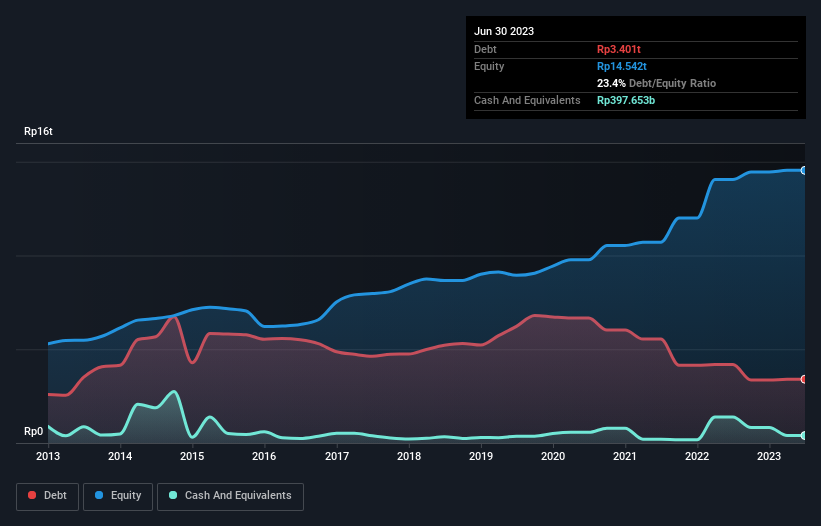Howard Marks put it nicely when he said that, rather than worrying about share price volatility, 'The possibility of permanent loss is the risk I worry about... and every practical investor I know worries about.' When we think about how risky a company is, we always like to look at its use of debt, since debt overload can lead to ruin. We note that Bumitama Agri Ltd. (SGX:P8Z) does have debt on its balance sheet. But the more important question is: how much risk is that debt creating?
When Is Debt Dangerous?
Generally speaking, debt only becomes a real problem when a company can't easily pay it off, either by raising capital or with its own cash flow. In the worst case scenario, a company can go bankrupt if it cannot pay its creditors. However, a more usual (but still expensive) situation is where a company must dilute shareholders at a cheap share price simply to get debt under control. Of course, debt can be an important tool in businesses, particularly capital heavy businesses. The first step when considering a company's debt levels is to consider its cash and debt together.
View our latest analysis for Bumitama Agri
What Is Bumitama Agri's Debt?
As you can see below, Bumitama Agri had Rp3.40t of debt at June 2023, down from Rp4.19t a year prior. However, it does have Rp397.7b in cash offsetting this, leading to net debt of about Rp3.00t.

How Strong Is Bumitama Agri's Balance Sheet?
According to the last reported balance sheet, Bumitama Agri had liabilities of Rp2.96t due within 12 months, and liabilities of Rp1.92t due beyond 12 months. Offsetting these obligations, it had cash of Rp397.7b as well as receivables valued at Rp352.1b due within 12 months. So its liabilities outweigh the sum of its cash and (near-term) receivables by Rp4.14t.
Bumitama Agri has a market capitalization of Rp12t, so it could very likely raise cash to ameliorate its balance sheet, if the need arose. However, it is still worthwhile taking a close look at its ability to pay off debt.
In order to size up a company's debt relative to its earnings, we calculate its net debt divided by its earnings before interest, tax, depreciation, and amortization (EBITDA) and its earnings before interest and tax (EBIT) divided by its interest expense (its interest cover). Thus we consider debt relative to earnings both with and without depreciation and amortization expenses.
Bumitama Agri has a low debt to EBITDA ratio of only 0.78. But the really cool thing is that it actually managed to receive more interest than it paid, over the last year. So there's no doubt this company can take on debt while staying cool as a cucumber. In fact Bumitama Agri's saving grace is its low debt levels, because its EBIT has tanked 43% in the last twelve months. When a company sees its earnings tank, it can sometimes find its relationships with its lenders turn sour. When analysing debt levels, the balance sheet is the obvious place to start. But ultimately the future profitability of the business will decide if Bumitama Agri can strengthen its balance sheet over time. So if you're focused on the future you can check out this free report showing analyst profit forecasts.
Finally, a business needs free cash flow to pay off debt; accounting profits just don't cut it. So it's worth checking how much of that EBIT is backed by free cash flow. In the last three years, Bumitama Agri's free cash flow amounted to 47% of its EBIT, less than we'd expect. That's not great, when it comes to paying down debt.
Our View
Bumitama Agri's EBIT growth rate and level of total liabilities definitely weigh on it, in our esteem. But its interest cover tells a very different story, and suggests some resilience. We think that Bumitama Agri's debt does make it a bit risky, after considering the aforementioned data points together. That's not necessarily a bad thing, since leverage can boost returns on equity, but it is something to be aware of. When analysing debt levels, the balance sheet is the obvious place to start. But ultimately, every company can contain risks that exist outside of the balance sheet. Case in point: We've spotted 2 warning signs for Bumitama Agri you should be aware of.
If you're interested in investing in businesses that can grow profits without the burden of debt, then check out this free list of growing businesses that have net cash on the balance sheet.
Valuation is complex, but we're here to simplify it.
Discover if Bumitama Agri might be undervalued or overvalued with our detailed analysis, featuring fair value estimates, potential risks, dividends, insider trades, and its financial condition.
Access Free AnalysisHave feedback on this article? Concerned about the content? Get in touch with us directly. Alternatively, email editorial-team (at) simplywallst.com.
This article by Simply Wall St is general in nature. We provide commentary based on historical data and analyst forecasts only using an unbiased methodology and our articles are not intended to be financial advice. It does not constitute a recommendation to buy or sell any stock, and does not take account of your objectives, or your financial situation. We aim to bring you long-term focused analysis driven by fundamental data. Note that our analysis may not factor in the latest price-sensitive company announcements or qualitative material. Simply Wall St has no position in any stocks mentioned.
About SGX:P8Z
Bumitama Agri
An investment holding company, engages in the production and trading of crude palm oil (CPO) and palm kernel (PK) in Indonesia.
Flawless balance sheet with solid track record and pays a dividend.
Market Insights
Community Narratives




